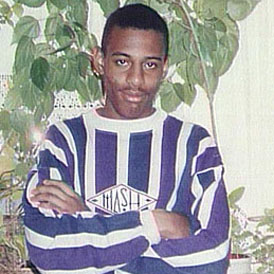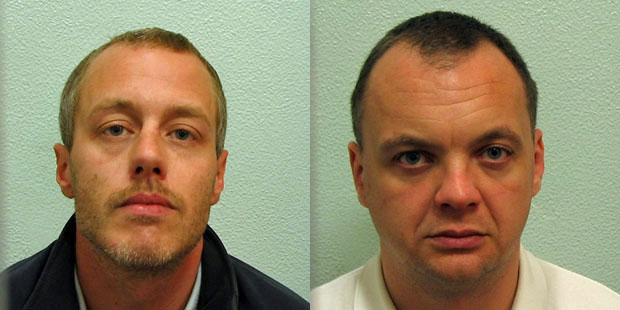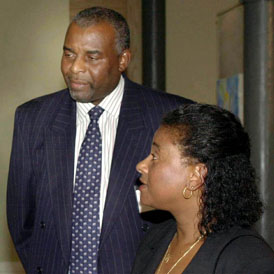Two men to stand trial for 1993 murder of Stephen Lawrence
The murder of Stephen Lawrence 18 years ago is one of Britain’s most notorious unsolved crimes. It can now be revealed that two men will go on trial over the killing after new evidence came to light.

Two men will stand trial later this year over the killing of black teenager Stephen Lawrence 18 years ago.
The 18-year-old A-level student was stabbed to death while he was waiting a bus stop with a friend, Duwayne Brooks, in Eltham, southeast London, in April 1993.
No one has ever been convicted of the murder, but a small team of Scotland Yard detectives has continued to investigate the death.
It can now be reported that Gary Dobson, 35, and David Norris, 34, were arrested last September over the murder and have been remanded in custody.
The allegations against them could not be reported until a Court of Appeal ruling on Wednesday for legal reasons.
Dobson and Norris are now expected to stand trial in November at the Old Bailey following a preliminary hearing due to take place in the next two months.
Norris, wearing a dark suit and tieless shirt, was at the Court of Appeal for Wednesday’s ruling while Dobson was not present.
The announcement that there is to be a new trial over Mr Lawrence’s death was made by the Lord Chief Justice Lord Judge, sitting at the Court of Appeal in London with Mrs Justice Rafferty and Mr Justice Holroyde.
He has waited 18 years for a full trial in relation to the murder of his son and he continues to hope for justice. Neville Lawrence’s lawyer
Norris has never before been charged over the stabbing, while Dobson was acquitted after a private murder prosecution brought in 1996 by Stephen’s parents.
A new law established in 2003 abolished the double jeopardy rule that prevented people being retried for the same crime if “compelling'” new evidence came to light.
New evidence
Lord Judge said the acquittal application "depends on the reliability of new scientific evidence" which "by reference" to a grey bomber jacket and a multi-coloured cardigan "closely links Dobson with the fatal attack on Stephen Lawrence".
He said: "It does not and could not demonstrate that Dobson wielded the knife which caused the fatal wound, but given the circumstances of the attack on Stephen Lawrence - that is, a group of youths in a violent enterprise converging on a young man and attacking him as a group - it would be open to a jury to conclude that any one of those who participated in the attack was party to the killing and guilty of murder, or alternatively manslaughter..."
Lord Judge said: "If reliable, the new scientific evidence would place Dobson in a very close proximity indeed to Stephen Lawrence at the moment of and in the immediate aftermath of the attack, proximity moreover for which no innocent explanation can be discerned.
"This decision means, and we emphasise that it means, no more than that the question whether Dobson had any criminal involvement in Stephen Lawrence's death must be considered afresh by a new jury, which will examine the evidence and decide whether the allegation against him is proved. The presumption of innocence continues to apply."
The appeal court agreed that new evidence is compelling enough to allow Dobson’s acquittal to be quashed.”As they waited peacefully for the bus, a group of white youths crossed the road towards them. One of the youths used abusive racist language. This was followed by a sudden and immediate attack, as the group converged on or charged at them.
“Duwayne Brooks managed to make his escape, but Stephen Lawrence was felled. He was stabbed twice to the upper torso. Major blood vessels were severed. The injuries were fatal.
“Mortally wounded, Stephen Lawrence managed to get to his feet. He ran after Duwayne Brooks, but after a little while, he collapsed on the pavement. He died shortly afterwards in hospital.”
The Lord Chief Justice said Stephen’s murder was a “calamitous crime”, adding: “He was a young black man of great promise, targeted and killed by a group of white youths just because of the colour of his skin.

In 1996 Dobson, Luke Knight and Neil Acourt were tried for murder in a private prosecution brought by Mr Lawrence’s parents at the Old Bailey.
But the judge in that trial ruled that purported identification evidence was not admissible and there was insufficient further evidence to justify the continuation of the prosecution.
The jury was directed to acquit the defendants and not guilty verdicts were entered.
Wednesday’s ruling by the appeal judges followed an application by the prosecution for the acquittal of Dobson to be quashed and for a retrial to be ordered.
Lifting previous blanket reporting restrictions on the case, Lord Judge announced: “There is to be a new trial.”

‘Relieved and delighted’
Mr Lawrence told Channel 4 News he was delighted with the appeal court’s decision: “I’ve waited 18 years for something to happen. I don’t think I would have been able to go on had the verdict gone the other way, so I’m pleased and delighted and looking forward to the next six months.”
Stephen’s mother Doreen told reporters: “It’s just been a long time for us to get to this position. That’s all I want to say.”
Stephen’s family have never given up hope that their son’s killers would eventually be brought to justice.
At the time of Stephen’s death he was studying English, design and technology, craft and physics at the Blackheath Bluecoat School and was hoping to become an architect.
An annual architectural award, the Stephen Lawrence Prize, was established by the Royal Institute of British Architects in his memory.
-
Latest news
-
Laughing Boy: New play tells the tragic tale of Connor Sparrowhawk5m

-
Sewage warning system allows some of worst test results to be left off rating system, analysis shows3m

-
Post Office inquiry: Former CEO didn’t like word “bugs” to refer to faulty IT system4m

-
Israeli soldier speaks out on war in Gaza12m

-
PM’s defence spending boost should be ‘celebrated’, says former Armed Forces Minister4m

-




